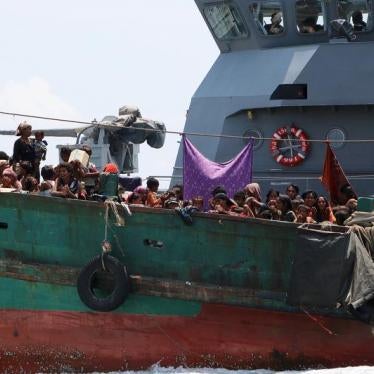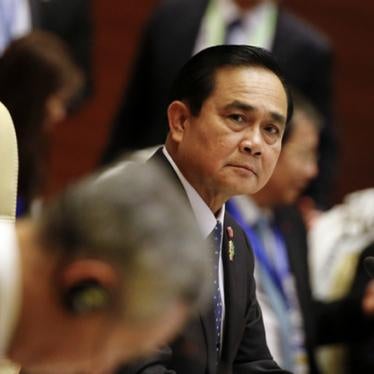(Bangkok) – On the occasion of the United Nations High Commissioner for Refugees (UNHCR) Mr. Filippo Grandi’s visit to Thailand, we, the undersigned, urge the Thai government to demonstrate its commitment to protecting refugees by ending abusive practices as well as instituting and implementing laws that guarantee the rights of refugees in Thailand. These rights should be guaranteed without discrimination on the basis of race, religion, nationality or national origin, or membership of a particular social group or political opinion.
On July 7, the head of UNHCR—the U.N. agency mandated to protect and identify permanent solutions for refugees—is scheduled to meet with Thai Prime Minister General Prayut Chan-o-cha to discuss the protection environment for refugees in Thailand. This is the first time in five years that a High Commissioner has visited Thailand, and it is part of a regional visit to countries in Asia Pacific.
According to UNHCR, Thailand hosts approximately 102,000 refugees, a majority of whom are protracted refugees from Myanmar living in temporary shelters along the Thailand-Myanmar border. Included in this figure are 8,000 “urban refugees” from Pakistan, Vietnam, Somalia, Iraq, Palestine, Syria, China, and other countries living in Bangkok and the surrounding provinces.
Although Thailand is not a party to the 1951 Refugee Convention or its 1967 Protocol, the Thai government has repeatedly expressed a commitment to protect refugees in Thailand, including most recently during the U.N. Human Rights Committee review of Thailand’s obligations under the International Covenant on Civil and Political Rights (ICCPR) in March 2017. As part of the review process, the Thai government affirmed a commitment to “humanitarianism and to take care of various groups of irregular migrants.” In a speech at the Leaders’ Summit on the Global Refugee Crisis on September 20, 2016 in New York, Prime Minister Prayut committed to end the detention of refugee children in Thailand and to establish an effective refugee-screening mechanism. The Prime Minister also committed to ensure that refugee returns to Myanmar would be voluntary and to increase refugees’ access to education, healthcare, and birth registration in Thailand.
These commitments are noteworthy and appreciated. However, we remain concerned by the lack of progress in implementing these commitments and addressing serious and ongoing human rights violations affecting the situation of refugees in Thailand. These include:
Refoulement
Thailand has long failed to respect the legally binding principle of non-refoulement, which is explicitly prescribed by Article 3 of the Convention against Torture and other Cruel, Inhuman or Degrading Treatment or Punishment and is considered part of customary international law. Under this principle, states are prohibited from returning an individual to a country where they may face torture or other serious human rights violations.
In recent years, Thai authorities have forcibly returned refugees, asylum seekers, and others based on the requests of foreign governments, despite the credible risk of torture or other grave human rights abuses. Most recently, on May 26, 2017, Thai transferred M. Furkan Sökmen, a Turkish national with alleged links to exiled Turkish cleric Fethullah Gülen, to the custody of Turkish authorities despite warnings by U.N. agencies that he would face human rights violations if returned. In 2015, Thailand also reportedly returned to China approximately 100 alleged Uighurs—an ethnically Turkic, predominantly Muslim minority in China. Uighurs returned to China are known to have faced persecution.
Thai authorities also are known to conduct unofficial deportations by transporting individuals to a border and forcing them into a neighboring country without appropriate regard to the risks of further human rights violations they may face. Thailand has implemented a “help-on” or “push back” policy with regard to possible refugees arriving by sea. Under this policy, Thai authorities have intercepted and towed ill-equipped boats of people out to sea. These policies and practices contravene the principle of non-refoulement and greatly endangering the lives of refugees. These policies and practices continue in Thailand at the time of writing.
In March, the U.N. Human Rights Committee reiterated Thailand’s obligation to “ensure in law and practice that people in need of international protection are not returned to a country where there are substantial grounds for believing that there is a real risk of irreparable harm...” During its review of Thailand’s obligations under the ICCPR, the Committee expressed concern about “reports of deportations and forcible returns without review or adequate assessment…” We share these concerns.
Arbitrary and Indefinite Detention
Thai authorities continue to arbitrarily and, in some cases, indefinitely detain refugees, asylum-seekers, and other migrants in immigration detention centers (IDCs) and government-run shelters. Although Thailand’s immigration detention facilities are designed for stays of up to 15 days, some refugees have been detained for several years. During its review of Thailand’s obligations under the ICCPR, the U.N. Human Rights Committee also expressed concern at reports of the protracted detention of refugees and called on Thailand to “refrain from detaining refugees, asylum seekers, and migrants and implement alternatives to detention…” The Thai government confirmed during the ICCPR review that 121 Rohingya from Myanmar’s Rakhine State and Bangladesh continue to be confined to government-run shelters, where their movement is limited and liberty denied.
In addition to concerns about the protracted detention of refugees, we are also concerned about the substandard conditions in Thailand’s IDCs. Detention facilities in Thailand can be severely overcrowded with appalling sanitation and limited access to basic needs, including clean water for washing and drinking, adequate and quality food, and sufficient toilets. The authorities have also detained children solely on the basis of their or their parents’ immigration status in violation of the rights of the child. Access to adequate medical care and psychological support in the IDCs is reportedly limited, which can lead to or exacerbate preventable medical conditions including skin and respiratory infections as well as tuberculosis. In May, a 36-year-old Pakistani asylum seeker died in a Bangkok IDC, bringing attention to the urgency of the situation.
Access to Legal Status
Currently, Thailand lacks a legal framework to assess asylum claims and fails to provide formal legal status to refugees in the country, heightening the risk of other human rights violations, including arbitrary and indefinite detention, refoulement, and human trafficking.
On January 10, 2017, Thailand adopted Cabinet Resolution 10/01, B.E. 2560, which created a “Committee for the Management of Undocumented Migrants and Refugees” to develop policies concerning the screening and management of undocumented migrants and refugees. This is a potentially positive step towards providing domestic legal status and basic rights to refugee and asylum seekers as well as ensuring the right to asylum as guaranteed by Article 14 of the Universal Declaration of Human Rights. While this Resolution lays the groundwork for developing effective procedures to identify and manage undocumented migrants and refugees, a screening mechanism that employs discriminatory or overly restrictive criteria could entrench rather than resolve outstanding concerns regarding asylum protections in Thailand.
We call on the Thai government to work closely with UNHCR, civil society, and refugees to develop a full, effective, and fair procedure to evaluate claims for refugee status and protection.
Lack of Access to Livelihoods and Labor Protections
Thailand’s labor laws prohibit refugees from working legally in the country. As a result, refugees often have no option but to engage in work that is frequently unauthorized and characterized as dangerous and degrading. Refugees generally do not enjoy the protections stipulated by Thailand’s Labor Protection Act and other domestic labor laws. Rather, refugees are often subjected to abusive, exploitative, and dangerous work environments. This is contrary to the International Covenant on Economic, Social and Cultural Rights (ICESCR), to which Thailand is a state party. Under Article 7 of the ICESCR, states are obliged to protect the rights of everyone to enjoy just and favorable conditions of work.
Access to Education
Thailand’s domestic legislation guarantees that all children have a right to quality and free “basic education provided by the State for the duration of at least 12 years,” regardless of legal status. However, most refugee children are largely unable to access Thai schools due to restrictions on movement, language barriers, and discriminatory treatment by school administrators. Access to secondary and tertiary education is even more limited.
Based on the above mentioned concerns, we urge the Government of Thailand to:
- Prevent the refoulement of individuals whose life or freedom would be threatened upon return to their home countries. In particular, Prime Minister Prayut Chan-o-cha should instruct relevant ministries and state security forces to discontinue the “help on” policy and to end the practice of unofficial deportations, which put refugees at risk of refoulement.
- End the arbitrary and indefinite detention of refugees and asylum seekers in immigration detention centers and government-run shelters, ensuring that refugees are never detained because of their immigration status and that asylum seekers are detained only in exceptional circumstances, following an individualized assessment, and after all less invasive alternatives to detention have been exhausted, and in conditions that meet international standards.
- Engage UNHCR, civil society, and refugees in meaningful consultations and ensure full access to information with regard to the planning and implementation of voluntary return programs on the Myanmar-Thailand border.
- Work transparently and in participation with UNHCR, civil society, and refugees to develop full, effective, and fair asylum procedures that are enshrined in legislation, effectively implemented, and in line with international standards. Ensure all individuals seeking asylum in Thailand have access to asylum procedures, regardless of the manner, place, or date of entry.
- Ensure that all refugees in Thailand are provided with access to legal documentation, healthcare, work permits and labor protections, educational opportunities, and other forms of assistance.
- Accede to the 1951 Convention Relating to the Status of Refugees and its 1967 Protocol as well as other key human rights treaties and withdraw the reservation to Article 22 of Convention on the Rights of the Child with regard to the rights of refugee and asylum seeking children.
Signatories:
Amnesty International
Asia Pacific Refugee Rights Network
Asylum Access Thailand
Coalition for the Rights of Refugees and Stateless Persons
Coalition on Refugee Protection
FIDH - International Federation for Human Rights
Fortify Rights
Human Rights Watch
Migrant Worker Rights Network
Migrant Working Group
People Empowerment Foundation
Save the Children
Ummatee








